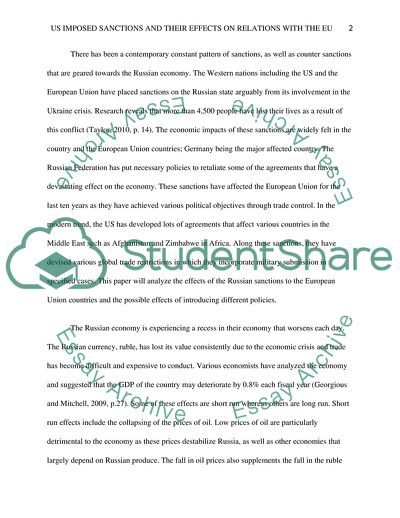Cite this document
(The US Imposed Sanctions and Their Effects on Relations with the EU Essay Example | Topics and Well Written Essays - 1250 words, n.d.)
The US Imposed Sanctions and Their Effects on Relations with the EU Essay Example | Topics and Well Written Essays - 1250 words. https://studentshare.org/politics/1880047-how-us-imposed-sanctions-in-russia-are-affecting-relations-with-the-eu
The US Imposed Sanctions and Their Effects on Relations with the EU Essay Example | Topics and Well Written Essays - 1250 words. https://studentshare.org/politics/1880047-how-us-imposed-sanctions-in-russia-are-affecting-relations-with-the-eu
(The US Imposed Sanctions and Their Effects on Relations With the EU Essay Example | Topics and Well Written Essays - 1250 Words)
The US Imposed Sanctions and Their Effects on Relations With the EU Essay Example | Topics and Well Written Essays - 1250 Words. https://studentshare.org/politics/1880047-how-us-imposed-sanctions-in-russia-are-affecting-relations-with-the-eu.
The US Imposed Sanctions and Their Effects on Relations With the EU Essay Example | Topics and Well Written Essays - 1250 Words. https://studentshare.org/politics/1880047-how-us-imposed-sanctions-in-russia-are-affecting-relations-with-the-eu.
“The US Imposed Sanctions and Their Effects on Relations With the EU Essay Example | Topics and Well Written Essays - 1250 Words”. https://studentshare.org/politics/1880047-how-us-imposed-sanctions-in-russia-are-affecting-relations-with-the-eu.


